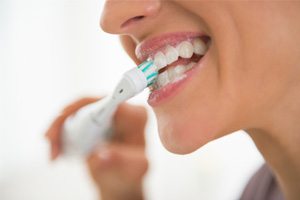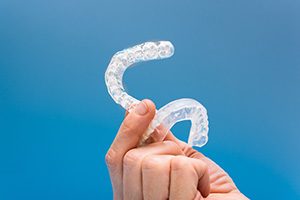Dental Implants — St. Augustine, FL
Planting the Roots for a Better Smile
When it comes to replacing your missing teeth, you have a lot of options to choose from. Dental bridges and dentures replace the parts of your missing teeth that are directly responsible for biting and chewing food. However, they don’t replace the roots of the missing teeth, meaning the underlying jawbone will start to break down as the body decides it’s not needed anymore. If you want to avoid bone loss and give your new teeth additional stability, call Salt Run Family Dentistry today to ask about dental implants in St. Augustine, FL – the modern gold standard when it comes to filling in empty space in a smile.
Why Choose Salt Run Family Dentistry For Dental Implants?
- Start-to-Finish Dental Implant Treatment Under 1 Roof
- Replace Any Number of Missing Teeth for Life
- Dental Implants Starting at $166/Month
What Are Dental Implants?

By itself, a dental implant doesn’t look like it could replace a tooth. It’s made of titanium and has a long, thin shape. However, once it has been placed in the jaw and has merged with the surrounding bone tissue, we can attach a crown, a bridge, or dentures on top of it in order to replace any number of teeth. The implant will secure your new teeth in place so that they don’t move when you chew or speak. They also encourage the jaw to continue producing bone tissue. Rebuilding the tooth from the roots up makes the results look, feel, and function just like natural.
The 4-Step Dental Implant Process

You’ll need to undergo minor oral surgery to have the implants placed in your jaw. The restoration phase won’t begin until the mouth has fully recovered, which can take up to six months. Fortunately, you won’t need to see a specialist for the different phases of the process, as our team can handle both stages right here at our St. Augustine location. The same skilled dentist and friendly staff will be here for you from the beginning to the end of the process. Here’s a brief look at what you can expect from the dental implant treatment.
Initial Dental Implant Consultation

At the beginning of the process, you will undergo an initial consultation with our team. This appointment will involve a thorough examination of your mouth and oral health to determine if dental implants would be a viable solution for rebuilding your missing teeth. In some instances, patients may need preliminary treatments to prepare their mouths for the procedure, such as gum disease treatment, bone grafting, or even tooth extraction if necessary. Once we’ve ensured that your jawbone density is sufficient and your gums are healthy, we can move forward with the surgical portion of the process.
Dental Implant Surgery

As mentioned before, you won’t have to visit a separate location to undergo your treatment; our team can perform the entire procedure in the office from start to finish. This means you can receive care from a dentist and team you already know and trust, and you won’t have to worry about traveling across town either.
At the start of your appointment, we’ll numb your mouth with a local anesthetic so that you don’t experience any pain or discomfort during your procedure. Your dentist will then make small incisions in your gum line where they’ll embed the implants in the jawbone. We’ll suture the gums closed around them and place protective caps to keep them safe while you heal.
Dental Implant Osseointegration & Abutment

Your recovery period will be necessary for your dental implants to undergo osseointegration—a process where the metal posts fuse with the jawbone tissue and become part of your facial structure. This will create a natural-feeling foundation that will make your restorations feel and function like normal pearly whites. This process should take around three to six months depending on your oral health and how well you take care of the surgical site(s). Once you’ve healed, you’ll return to our office to receive your abutments and we’ll take impressions of your smile to fabricate your final restorations/prosthetics.
Delivery of Dental Implant Restoration(s)

After your gums have healed from receiving your abutments, you’ll come back to us so that we can place your new dental crown, bridge, or denture. Our team will verify that your new teeth fit perfectly and that your bite is correct, and we’ll make any minor adjustments if necessary. If you’re satisfied with your results, you’ll be free to enjoy your brand-new smile for all the world to see!
Benefits of Dental Implants

Your smile deserves the best, and in many situations that means getting dental implants. While all dental restorations have their pros and cons, implants have many benefits that more traditional options can’t match. Here are some of the advantages of dental implants that you can expect to experience.
Day-to-Day Benefits

Dental implants feel and look just like natural teeth, so you shouldn’t even notice them in your everyday life. Here are some of the benefits that you can experience daily:
- Bite Force: Thanks to the added stability of implants, you can eat whatever you want, including tougher foods.
- Easy Maintenance: Caring for dental implants is just like caring for your natural teeth. Brush twice, floss, and rinse with mouthwash every day.
- Increased Confidence: The prosthetics attached to your implant will be designed to blend in with the rest of your mouth.
Health Benefits

In addition to daily benefits, your health will be positively affected by your dental implants. Here are some health benefits you can look forward to:
- Improved Oral Health: Attaching a bridge to implants instead of natural teeth will let you preserve more of your enamel. Dental implants also help to prevent additional oral health issues from arising, like gum disease and further tooth loss.
- Improved General Health: Having excellent oral health will have a positive influence on your overall health. It even lowers your risk of serious medical issues, like diabetes and cardiovascular disease.
- Prevents Bone Loss: The stimulation of implants will prevent bone loss, which will help keep your remaining teeth firmly in place.
Long-Term Benefits

When you choose dental implants, you are making an investment in the future of your smile. Here are some benefits you can enjoy for many years to come:
- Long-Lasting: The implant posts can last for decades at a time, and many patients end up keeping them for the rest of their lives.
- Successful: Dental implants have an astonishing success rate of over 95%. Dental implant failure is highly unlikely when the implants are cared for properly.
- Save Money: You don’t need to worry about buying adhesives or soaking solutions for dental implants. You also don’t need to pay for frequent repairs or replacements. Dental implants also reduce your risk of many oral health issues, saving you time, discomfort, and money.
Who Dental Implants Can Help

Are you healthy overall? Does your jaw still have plenty of bone tissue? If the answers to both questions are “yes”, you should strongly consider getting implants. Dental implants can be used to replace any number of missing teeth anywhere in the mouth. Once we’ve ensured you’re a good candidate for them, we’ll design your treatment plan around how many missing teeth you have.
Who Is a Good Candidate for Dental Implants?

Many patients who have lost permanent teeth qualify for this treatment. The basic requirements are that you have a healthy (i.e., infection-free) mouth and enough supportive bone tissue in your jaw. It’s also important that you don’t have any overall health issues that could lead to complications during or after oral surgery, such as unmanaged cardiovascular disease or diabetes. We will recommend that tobacco users start to cut down as well, as smoking or chewing drastically increases the chance of implant failure. During your consultation, we’ll evaluate you to determine whether implants are a good fit. Fortunately, even if you don’t initially qualify for this treatment, you can undergo procedures, like a bone graft or gum disease therapy, which can enable you to get implants later on.
Missing 1 Tooth

Just a single lost tooth can throw off the balance of your bite and lead to further oral health problems. We can fill in a gap with an implant that has a dental crown attached. It will take a few months for the implant to fuse with the jaw; the crown is placed after healing is complete. It will be specially shaped and shaded so that it blends in seamlessly with the rest of the teeth.
Missing Multiple Teeth

Instead of individual implants for every tooth that you’ve lost, a row of three or more teeth can be replaced by a dental bridge that rests on two implants. Unlike traditional bridges, this process won’t require any permanent changes to the healthy teeth that remain in your mouth. Plus, the bridge can be fixed, meaning you won’t have to take it out to clean.
Missing All Teeth

Traditional dentures rest on the gums; because of this, they can start to slip or become ill-fitting once the jaw changes shape. This occurs naturally following tooth loss. Fortunately, dental implants can address both problems at once. It normally takes about four to six implant posts to support a full set of dentures in the upper or lower jaw. Implant dentures are not only smaller but more stable than regular ones, and they also maintain their day-one fit for longer thanks to the bone support provided by the posts. While traditional dentures restore about 20% of a person’s biting force, implant dentures have been shown to bring back about 70%. This makes it easier to chew a wider variety of foods as well as sustain a more nutritious diet.
Understanding the Cost of Dental Implants

When you come to Salt Run Family Dentistry for dental implants, you need to understand that there isn’t a fixed cost for the procedure. Every patient has different needs, and the treatment will need to be customized accordingly. As such, there are many different factors that can end up changing the amount that you pay. Our team will work with you to create your implant treatment plan, then help you create an estimate of the final cost of dental implants in Lisle. To help make your new smile as affordable as possible, we’ll help maximize your dental insurance and review your financing options. We’re also proud to offer a free dental implant consultation as well as dental implants starting at just $166/month.
Preliminary Treatments & Dental Implant Surgery

Obviously, the surgery to place implants in your mouth will have its own cost. (We complete the surgery in-house, so you don’t have to worry about another practice billing you.).
Before the implants can be placed, though, some patients might need gum disease therapy, bone grafts, or some other kind of preliminary treatment meant to help create an environment where dental implants can thrive. Such treatments will have separate costs of their own, but they’ll be well worth it to be able to enjoy your dental implants for decades.
The Parts of Your Dental Implant

Each component that makes up your dental implants will incur its own cost. When making an estimate, we’ll look at:
- The number of implants you need to replace all of your teeth (normally one for a single tooth, two for multiple teeth in a row, and four or more for an entire arch)
- The type of restoration that will be placed on your implant(s) (with small restorations such as crowns carrying a lower cost than larger restorations like dentures)
- The material used to make the implant posts (which is usually titanium)
- The brand of implant used (different manufacturers make implants to accommodate for different patients’ needs, and that ends up influencing the cost)
How Dental Implants Can Pay for Themselves

Dental implants cost more initially than traditional tooth replacements, but if you take good care of them, they’ll end up paying for themselves. They don’t have to be replaced as often as dentures and bridges; in fact, some patients never need to replace them at all. That means spending less money on new teeth and additional appointments over the years. Also, there’s no need to buy any special solutions for implant maintenance, as you can just brush and floss like you’ve always have. In fact, taking care of implants is so simple, they can actually lower your risk for gum disease and other oral health issues that you might have to pay to treat.
Does My Dental Insurance Cover Dental Implants?

This is a question that can only be answered by reviewing your insurance policy. Usually, you’ll find that your plan won’t help pay for the implants themselves, but they may still partially cover the restoration or some of the preliminary treatments. Our team will work with you to find ways to get the absolute most out of your policy.
Making Dental Implants Affordable

Our office is in-network with Humana, and we can take other plans as well. Patients who don’t have insurance can apply for a CareCredit financing plan to break up the cost of dental implants; there’s little to no interest to worry about, and the plan can be used to help pay for treatments that aren’t covered by insurance.
Dental Implant Failure & Salvage

Did you know that dental implants boast an unmatched success rate of 95%? In fact, that success rate remains the same even 10 years after placement! Nonetheless, dental implant failure is a remote possibility that you should know how to identify. Fortunately, if you begin to experience any signs of a failing dental implant, we will likely be able to save your newly rebuilt smile with dental implant salvage in St. Augustine. If you’re ever concerned about the well-being of your dental implant or any uncomfortable symptoms you’re experiencing, don’t hesitate to call us right away.
Learn More About Dental Implant Failure & Salvage
Dental Implants Post-Op Instructions

Many patients worry about dental implant recovery because they’re unsure what’s involved. For example, you might have questions, like what symptoms are considered normal and how to care for your new restoration.
Our Salt Run Family Dentistry team will provide detailed instructions to help you heal effectively without developing complications. Continue reading to learn more about what to expect following your procedure, and feel free to contact us if you have additional questions!
What to Do Directly After Dental Implant Surgery

Your immediate concern following your procedure is protecting the blood clot that forms over the implant site to protect the exposed nerves, bone, and tissues. The following tips can keep it intact:
- Swallow or use tissues to wipe up drool or excess saliva rather than spit.
- Avoid drinking through a straw.
- Don’t smoke cigarettes or vapes.
- Try not to touch the surgical site with your tongue, fingers, or anything else.
Common Side Effects When Recovering from Dental Implant Placement

You’ll be numbed and/or sedated for the implant procedure itself, so you won’t have to worry about potential side effects until after those medications wear off.
Then, it’s normal to experience the following symptoms:
- Intermittent bleeding. This can go on for several days and can be managed by placing clean, folded gauze and biting down firmly.
- You’ll likely feel inflamed for the first 72+ hours. This can be addressed with alternating warm and cold compresses to provide temporary relief.
- General throbbing. It’s normal to feel mild to moderate aches, which tend to peak around the third day after your surgery, then begin to subside. Taking ibuprofen and Tylenol is usually a safe way to alleviate the sensation.
Please let us know immediately if you have persistent or severe pain that doesn’t abate after a few days, so we can ensure you’re healing as intended.
Your Diet After Dental Implant Surgery

Eating hot, hard, crunchy, spicy, or sticky foods can trigger your already tender tissues, so it’s best to stick with liquid foods for the first day or so. Then, you can graduate to softer solids until we give you the green light to resume your regular diet. Popular options include yogurt, ice cream, applesauce, mashed potatoes, scrambled eggs, pudding, soup (that’s not overly hot), and cooked pasta.
Post-Op Health & Oral Hygiene

Although dental implants in St. Augustine have an incredibly high success rate of more than 90%, you must clean your mouth consistently to prevent oral issues, like infection or gum disease. Typically, it’s safe to brush your teeth as usual the day after your appointment, but you should be careful not to disturb the surgical site.
You should also rinse your mouth 2 or 3 times daily with warm salt water to naturally disinfect unwanted germs. Please avoid mouthwashes with alcohol, and if you have a prescription rinse, use it exactly as directed.
What to Do After Your New Teeth Are Attached

Once your mouth has healed sufficiently, we can attach your dental crown, bridge, or dentures. This is a much more straightforward process, and though you might experience some sensitivity, it’s not considered painful. There shouldn’t be any additional aches, bleeding, or inflammation, so you can feel free to enjoy your beautifully restored smile!
Maintaining & Caring for Your Dental Implants

One of the many perks of dental implants is their lifespan; they can last for 30+ years! Although this state-of-the-art tooth-replacement solution is among the most complex in dentistry, taking care of them is relatively simple. The key is implementing good habits and breaking bad ones, like:
Make Oral Hygiene a Priority

Although your dental implants may not decay or develop an infection, your gums and any remaining teeth you have still can! That’s why it’s so important to commit to good oral hygiene habits at home, starting with brushing your teeth for two full minutes. Since brushing alone only cleans about 60% of the surface of your teeth, make sure that you floss and rinse with mouthwash consistently too.
Eat a Healthy Diet

Eating foods that contain essential vitamins, minerals, and nutrients is important because they ensure your body has everything it needs to keep your bones strong, your enamel healthy, and your gums infection-free. So, make sure that your diet is filled with seasonal fruits, lean proteins, and fresh vegetables. Also, avoid extremely crunchy foods, like hard pretzels and peanut brittle.
Break Bad Habits

Did you know that smoking increases your risk of dental implant failure significantly? That’s why we recommend avoiding all tobacco products; it will increase your odds of having long-lasting implants. Outside of that, don’t bite your nails, chew on ice cubes, use your teeth as tools to open things, or do anything else that has the potential to compromise your dental implants.
Protect Your Dental Implants

If you frequently wake up with a sore jaw and throbbing headache, then you may have Bruxism. Nighttime grinding and clenching may not seem like much of an issue, but the significant pressure that’s placed on your teeth and dental implants can lead to several problems, including noticeable chips and considerable cracks. So, talk to us about having a custom nightguard made!
Schedule Regular Dental Checkups

With routine checkups and cleanings, we can screen for oral cancer, catch (and treat) oral health problems in the early stages, and remove plaque before it accumulates and leads to gum disease. Plus, these visits give us a chance to periodically check the condition of your dental implant and, if we see anything wrong, pinpoint the root of the problem and the best way to address it.
If you have any questions for our St. Augustine dental team about maintaining and caring for your dental implants – whether it’s regarding the products you should be using or technique – don’t hesitate to give us a call so we can provide you with an answer!
Dental Implant FAQs

Choosing to replace your missing teeth with dental implants is a big investment. Before you move forward, you may have questions that need answers. We’re here to help you! Take a look at the responses we’ve provided below for some guidance on the most common inquiries. If you would like to talk to us in greater detail about dental implants, we encourage you to schedule a consultation with us. We’ll happily address your concerns and help you find a solution for your missing teeth.
What Is the Success Rate of Dental Implants?
Overall, dental implants are very successful. In fact, about 95 percent of dental implants are still successful even 20 years after they were placed. In the cases where the implants failed, it’s usually because the patients didn’t properly maintain the implants, or there was an unknown pre-existing condition that interfered with success. That’s why we take the time beforehand to make sure this treatment is right for you. We also stress the importance of taking care of your dental implants so that they can last for many, many years.
Does Dental Insurance Cover Dental Implants?
It depends. Insurance plans can vary in their specific benefits, but in general most of the cost of dental implants is not covered by insurance. However, the restoration that attaches to the implants may be partially covered, and if you require preliminary procedures, such as gum disease therapy, this work may fall under your plan’s benefits. Our team can double check your insurance and try to find ways of lowering your out-of-pocket costs as much as possible.
